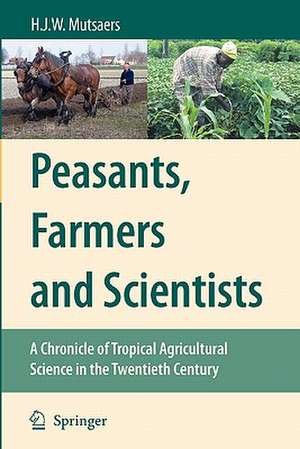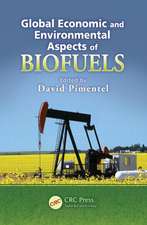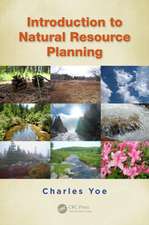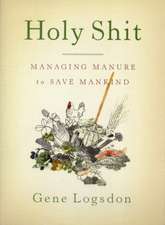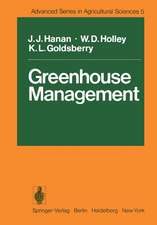Peasants, Farmers and Scientists: A Chronicle of Tropical Agricultural Science in the Twentieth Century
Autor H.J.W. Mutsaersen Limba Engleză Paperback – 19 oct 2010
| Toate formatele și edițiile | Preț | Express |
|---|---|---|
| Paperback (1) | 960.42 lei 6-8 săpt. | |
| SPRINGER NETHERLANDS – 19 oct 2010 | 960.42 lei 6-8 săpt. | |
| Hardback (1) | 967.08 lei 6-8 săpt. | |
| SPRINGER NETHERLANDS – 21 sep 2007 | 967.08 lei 6-8 săpt. |
Preț: 960.42 lei
Preț vechi: 1171.25 lei
-18% Nou
Puncte Express: 1441
Preț estimativ în valută:
183.80€ • 189.88$ • 152.97£
183.80€ • 189.88$ • 152.97£
Carte tipărită la comandă
Livrare economică 25 martie-08 aprilie
Preluare comenzi: 021 569.72.76
Specificații
ISBN-13: 9789048175550
ISBN-10: 9048175550
Pagini: 636
Ilustrații: XXVIII, 608 p.
Dimensiuni: 155 x 235 x 33 mm
Greutate: 0.88 kg
Ediția:Softcover reprint of hardcover 1st ed. 2007
Editura: SPRINGER NETHERLANDS
Colecția Springer
Locul publicării:Dordrecht, Netherlands
ISBN-10: 9048175550
Pagini: 636
Ilustrații: XXVIII, 608 p.
Dimensiuni: 155 x 235 x 33 mm
Greutate: 0.88 kg
Ediția:Softcover reprint of hardcover 1st ed. 2007
Editura: SPRINGER NETHERLANDS
Colecția Springer
Locul publicării:Dordrecht, Netherlands
Public țintă
ResearchCuprins
What Is Tropical Agronomy?.- A Tropical Agronomist's Education.- Old and New: The 1960s and 1970s.- Farmers Are Smarter Than You Think.- Forests, Fallows and Fields.- Farmer Skills, an Elusive Property.- Mainly Technology.- Follies and Sanity of Farming Systems Research.- The Modelling Sorcerers and Their Apprentices.- Donors, Experts and Consultants.- Can African Farming Be Improved? (And Can Agronomists Help?).
Recenzii
From the reviews:
“Peasants, Farmers and Scientists is a narration of tropical agricultural case studies from the East Indies and West and Central Africa during the latter half of the 20th century. It is also a memoir and an introductory monograph for agronomy curricula … . The book balances the potential of the African farmer and the demise of agriculture with descriptions of development, donors, station research, scientists (both foreign and local), farmers’ responses, and applications of extension work. Summing Up: Recommended. Lower-division undergraduates and up.” (W. K. Bauchspies, CHOICE, Vol. 45 (11), 2008)
“This book is a highly readable, engaging and thorough introduction to agriculture in the tropics and to the evolution of tropical agriculture as a science in the twentieth century. It reviews agriculture’s ‘‘successes as well as its fads and failures" and discusses how agricultural sciences contributed or not to the advancement of the small-holders producers, particularly in Africa. It focuses primarily on the second, post-colonial half of the century, and builds on the author’s first-hand observations as a researcher in a plantation in the Dutch West Indies, Wageningen University lecturer and long-time researcher at the International Institute of Tropical Agriculture (IITA) in Ibadan, Nigeria. … The book is a welcome addition to the body of reading materials for introductory, comprehensive courses in international development or international agriculture. The author systematically introduces concepts like shifting cultivation (‘‘the mother of all farming"), semi-intensive farming, nutrient budgets and crop modeling, and provides field examples to explain how these concepts work in reality. … The book also serves as a strong introduction to the history of Farming Systems Research (FSR), the author being one of the founding proponents of the approach. … a book that clearly, and often humorously, takes stockof tropical agriculture in a balanced yet candid manner.” (Carlos Perez, Earth Institute, Columbia University, Palisades, NY 10964, USA)
“Peasants, Farmers and Scientists is a narration of tropical agricultural case studies from the East Indies and West and Central Africa during the latter half of the 20th century. It is also a memoir and an introductory monograph for agronomy curricula … . The book balances the potential of the African farmer and the demise of agriculture with descriptions of development, donors, station research, scientists (both foreign and local), farmers’ responses, and applications of extension work. Summing Up: Recommended. Lower-division undergraduates and up.” (W. K. Bauchspies, CHOICE, Vol. 45 (11), 2008)
“This book is a highly readable, engaging and thorough introduction to agriculture in the tropics and to the evolution of tropical agriculture as a science in the twentieth century. It reviews agriculture’s ‘‘successes as well as its fads and failures" and discusses how agricultural sciences contributed or not to the advancement of the small-holders producers, particularly in Africa. It focuses primarily on the second, post-colonial half of the century, and builds on the author’s first-hand observations as a researcher in a plantation in the Dutch West Indies, Wageningen University lecturer and long-time researcher at the International Institute of Tropical Agriculture (IITA) in Ibadan, Nigeria. … The book is a welcome addition to the body of reading materials for introductory, comprehensive courses in international development or international agriculture. The author systematically introduces concepts like shifting cultivation (‘‘the mother of all farming"), semi-intensive farming, nutrient budgets and crop modeling, and provides field examples to explain how these concepts work in reality. … The book also serves as a strong introduction to the history of Farming Systems Research (FSR), the author being one of the founding proponents of the approach. … a book that clearly, and often humorously, takes stockof tropical agriculture in a balanced yet candid manner.” (Carlos Perez, Earth Institute, Columbia University, Palisades, NY 10964, USA)
Notă biografică
The author, who graduated from Wageningen University in the Netherlands in June 1967 and obtained a PhD degree there in April 1982, has spent a lifetime working in a wide range of tropical agronomy-related fields. He started his career in a cotton development project in Indonesia, lectured and carried out research at the Universities of Wageningen, Yaoundé (Cameroun) and Ibadan (Nigeria) and played a key role in the introduction of the ‘Farming Systems Research’ approach in West and Central Africa when working at the International Institute of Tropical agriculture in Ibadan. Since 1994 he has been attached to the Nedworc Foundation in the Netherlands and travelled to many African, Asian and Latin American countries to formulate, assist and evaluate agricultural research and development programmes. Dr. Mutsaers is the author and co-author of numerous scientific papers on crop physiology, crop modelling, farming systems and on-farm research, as well as several books, including two on on-farm research methodology.
Textul de pe ultima copertă
This book is a critical account of tropical agricultural science and agricultural development in the twentieth century, in particular in Africa. It describes successes as well as fads and failures, from the perspective of a practitioner of more than 40 years. The emphasis is on the second half of the century, but the story frequently reaches deep into the first half of the century as well.
The book’s premise is that the story of tropical agricultural science and agricultural development can be told in a single volume at a more than trivial level, understandable for people of normal intelligence. It tries to uncover what real value there has been in the major areas of study (Farming Systems Research, Natural Resource Management, crop modelling, etc.) after peeling off the multiple protective layers applied by the profession. It also takes a critical look at agricultural and general development which has become inflated with hot air to the point of blowing itself apart in the early twenty first century.
A wide range of topics is covered, including interesting early science from the beginning of the last century (sugarcane breeding and shifting cultivation in Indonesia, anthropological studies in German West Africa), fascinating indigenous farming practices in Africa, the history of Farming Systems Research and its offshoots, sense and nonsense of computer modelling of crop growth, and the role of development projects and consultants. The treatment is closely linked with the author's professional career, but the emphasis is on the subject matter.
The book’s premise is that the story of tropical agricultural science and agricultural development can be told in a single volume at a more than trivial level, understandable for people of normal intelligence. It tries to uncover what real value there has been in the major areas of study (Farming Systems Research, Natural Resource Management, crop modelling, etc.) after peeling off the multiple protective layers applied by the profession. It also takes a critical look at agricultural and general development which has become inflated with hot air to the point of blowing itself apart in the early twenty first century.
A wide range of topics is covered, including interesting early science from the beginning of the last century (sugarcane breeding and shifting cultivation in Indonesia, anthropological studies in German West Africa), fascinating indigenous farming practices in Africa, the history of Farming Systems Research and its offshoots, sense and nonsense of computer modelling of crop growth, and the role of development projects and consultants. The treatment is closely linked with the author's professional career, but the emphasis is on the subject matter.
Caracteristici
Presents a thorough review of more than 50 years of tropical agronomy Examines the African farmer, farming methods both present and future Information on agricultural research including farming systems Examines the rise of computer modelling of crops and crop production and the relevance of modelling for rank and file agriculturists The roles of donors, experts and consultants, and a critical assessment of development aid
